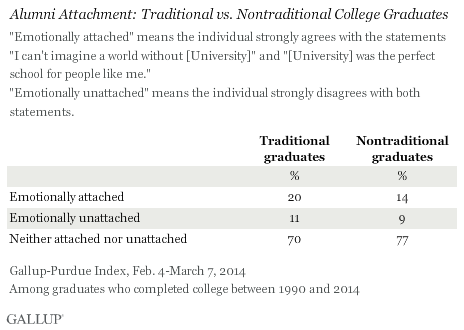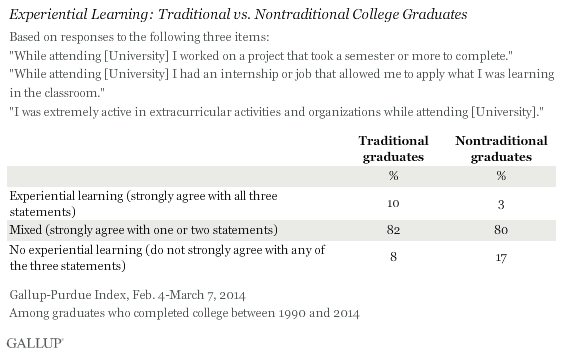Story Highlights
- Older graduates less likely to be emotionally attached to alma mater
- Nontraditional graduates have less experiential learning
This is the second article in a two-part series examining the life outcomes and college experience of those who earn their degree at age 25 or older. Read the first article here.
WASHINGTON, D.C. -- A growing presence in the university ranks, nontraditional graduates, or individuals who complete college at age 25 or older, are less likely to be emotionally attached to their alma mater (14%) than are traditional graduates (20%).

Graduates are determined to be emotionally attached to their alma mater if they simultaneously strongly agree that they "can't imagine a world without" their degree-awarding university and that their university "was the perfect school." These results come from the Gallup-Purdue Index study, a joint research effort with Purdue University and Lumina Foundation to study the relationship between the college experience and college graduates' lives. The results are based on surveys with nearly 4,000 nontraditional graduates and approximately 7,500 traditional college graduates as part of the Gallup-Purdue Index.
Alumni attachment is important -- both for the graduate and the graduate's college or university. The Gallup-Purdue Index finds that graduates who are emotionally attached to their school are two times more likely to be thriving in all five elements of the Gallup-Healthways Well-Being Index. That is, emotionally attached graduates are twice as likely to be thriving in purpose, social, financial, community and physical well-being. Research from the Gallup-Purdue Index also finds that emotionally attached graduates are twice as likely to be engaged in their jobs.
And in the competitive world of university fundraising, having an emotionally attached alumni network could prove invaluable. Given the rising number of nontraditional college students, it is clearly important for schools to find ways to engender emotional attachment among this crucial bloc. However, this could prove challenging, since nontraditional students are less likely to live on campus or participate in extracurricular activities -- suggesting typical methods of connecting with undergraduates will not be as useful in reaching out to older enrollees.
Nontraditional Graduates Less Likely to Have Experiential Learning
In addition to being less emotionally attached to their alma mater, nontraditional graduates report having fewer opportunities for "experiential learning" while in college than traditional graduates -- in other words, they are less likely to strongly agree that they had a semester-long project, had an internship or a job that allowed them to apply what they were learning, or were extremely active in extracurricular activities.

Just 3% of nontraditional graduates strongly agree that they had all three types of experiential learning opportunities, compared with 10% of traditional graduates. And the rate of nontraditional graduates who strongly agree that they had none of the three experiential learning opportunities is double that of traditional graduates (17% vs. 8%, respectively). The vast majority of graduates fall somewhere in between, neither strongly agreeing with all three statements nor strongly disagreeing with all three.
Experiential learning has been linked to higher work engagement. Finding ways to ensure nontraditional graduates enjoy experiential learning, however, will be no easy task for colleges. Older students may have less time for an internship, as they may be working full time to support themselves. They may feel less compelled to be active in extracurricular activities or organizations, or simply just not have the availability to participate.
Bottom Line
With the U.S. Department of Education estimating that 40% of today's college-attending population is older than age 25, universities must find ways to connect with this different type of student. Currently, nontraditional graduates are less emotionally attached to their university and report having had fewer experiential learning opportunities than traditional graduates. Finding ways to engage this increasingly common type of student should be an important priority for universities.
Survey Methods
Results for this Gallup-Purdue Index study are based on Web interviews conducted Feb. 4-March 7, 2014, with a random sample of 29,560 respondents with a bachelor's degree or higher, aged 18 and older, with Internet access, living in all 50 U.S. states and the District of Columbia. For results based on the total sample of bachelor's degree or higher respondents who graduated between 1990 and 2014, and are traditional college students, the margin of sampling error is ±1.8 percentage points at the 95% confidence level. For results based on the total sample of bachelor's degree or higher respondents who graduated between 1990 and 2014, and are nontraditional college students, the margin of sampling error is ±2.5 percentage points at the 95% confidence level.
The Gallup-Purdue Index sample was compiled from two sources: the Gallup Panel and the Gallup U.S. Daily survey.
Learn more about how the Gallup-Purdue Index works.


